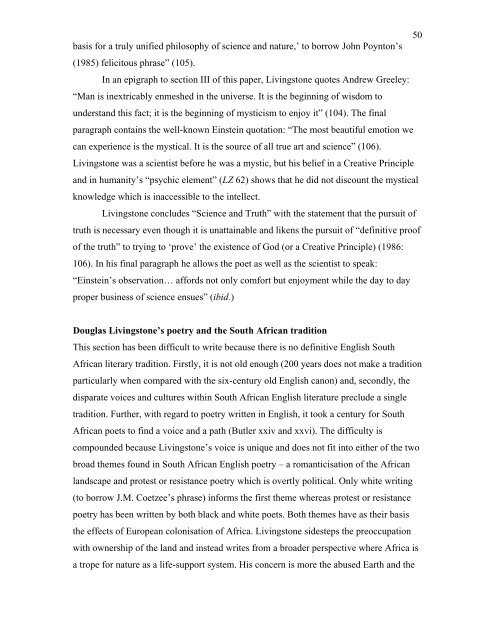"Symbiosis or Death": - Rhodes University
"Symbiosis or Death": - Rhodes University
"Symbiosis or Death": - Rhodes University
Create successful ePaper yourself
Turn your PDF publications into a flip-book with our unique Google optimized e-Paper software.
50<br />
basis f<strong>or</strong> a truly unified philosophy of science and nature,’ to b<strong>or</strong>row John Poynton’s<br />
(1985) felicitous phrase” (105).<br />
In an epigraph to section III of this paper, Livingstone quotes Andrew Greeley:<br />
“Man is inextricably enmeshed in the universe. It is the beginning of wisdom to<br />
understand this fact; it is the beginning of mysticism to enjoy it” (104). The final<br />
paragraph contains the well-known Einstein quotation: “The most beautiful emotion we<br />
can experience is the mystical. It is the source of all true art and science” (106).<br />
Livingstone was a scientist bef<strong>or</strong>e he was a mystic, but his belief in a Creative Principle<br />
and in humanity’s “psychic element” (LZ 62) shows that he did not discount the mystical<br />
knowledge which is inaccessible to the intellect.<br />
Livingstone concludes “Science and Truth” with the statement that the pursuit of<br />
truth is necessary even though it is unattainable and likens the pursuit of “definitive proof<br />
of the truth” to trying to ‘prove’ the existence of God (<strong>or</strong> a Creative Principle) (1986:<br />
106). In his final paragraph he allows the poet as well as the scientist to speak:<br />
“Einstein’s observation… aff<strong>or</strong>ds not only comf<strong>or</strong>t but enjoyment while the day to day<br />
proper business of science ensues” (ibid.)<br />
Douglas Livingstone’s poetry and the South African tradition<br />
This section has been difficult to write because there is no definitive English South<br />
African literary tradition. Firstly, it is not old enough (200 years does not make a tradition<br />
particularly when compared with the six-century old English canon) and, secondly, the<br />
disparate voices and cultures within South African English literature preclude a single<br />
tradition. Further, with regard to poetry written in English, it took a century f<strong>or</strong> South<br />
African poets to find a voice and a path (Butler xxiv and xxvi). The difficulty is<br />
compounded because Livingstone’s voice is unique and does not fit into either of the two<br />
broad themes found in South African English poetry – a romanticisation of the African<br />
landscape and protest <strong>or</strong> resistance poetry which is overtly political. Only white writing<br />
(to b<strong>or</strong>row J.M. Coetzee’s phrase) inf<strong>or</strong>ms the first theme whereas protest <strong>or</strong> resistance<br />
poetry has been written by both black and white poets. Both themes have as their basis<br />
the effects of European colonisation of Africa. Livingstone sidesteps the preoccupation<br />
with ownership of the land and instead writes from a broader perspective where Africa is<br />
a trope f<strong>or</strong> nature as a life-supp<strong>or</strong>t system. His concern is m<strong>or</strong>e the abused Earth and the

















